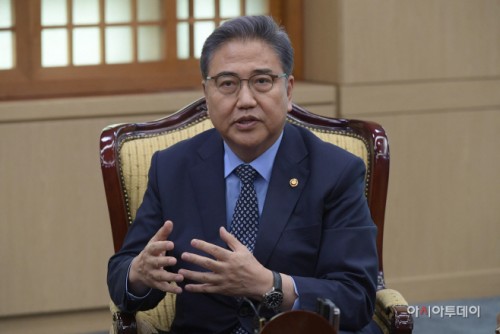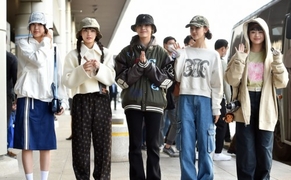 |
| South Korean Foreign Minister Park Jin/ Photographed by Song Eui-joo (songuijoo@) |
AsiaToday reporter Lee Wook-jae
South Korean Foreign Minister Park Jin will hold a bilateral talk with his Japanese counterpart Yoshimasa Hayashi this week to seek ways to improve bilateral relations during his three-day visit to Japan from Monday to Wednesday. Amid grieving for Japan’s Former Prime Minister Shinzo Abe, attention is focused on whether the talks would find a way to improve the bilateral relations.
It would be the foreign minister’s first official trip to Japan since taking the role, the South Korean Foreign Ministry said on Sunday. The bilateral meeting of the foreign ministers in Japan would be the first in four years and seven months after the last one was held in December 2017.
The South Korean government’s will to improve the Seoul-Tokyo relations is quite strong. In this regard, new South Korean Ambassador to Japan Yun Duk-min said President Yoon Suk-yeol conveyed to him his resolve to “restore South Korea-Japan relations as soon as possible to when they were best.” Minister Park is expected to actively publicize the will of the South Korean government and make an effort to make a breakthrough in improving the bilateral relations, during his Japan visit.
One of the major sticking points is the South Korean top court’s rulings ordering Japanese companies that forced Koreans into labor during the Japanese colonization of the Korean Peninsula to provide compensation for the victims. The Japanese government claims all issues regarding reparation were settled with a 1965 accord through economic cooperation worth $500 million provided to the Korean government. As a result, the Japanese government claims that the South Korean government should take responsibility for the resolution of the court ruling where the top court ordered Japan’s Mitsubishi Heavy to pay 100-150 million won in damages to each of the victims that filed the suit. If the court orders the companies to liquidate their Korea-based assets to provide the compensation around August and September, the Japanese government is expected to protest strongly against the decision, calling it a “red line”.
Park’s planned visit seems to be in line with Japan’s “red line” warning. The government is seemingly planning to open the door for dialogue before the relations between the two countries deteriorate further. Although it is not easy to resolve the compensation issue immediately, the foreign minister is expected to deliver the South Korean government’s will to seek a solution to the Japanese government, by mentioning its formation of a public-private council early this month to resolve the issue.
Meanwhile, the fact that Japan’s ‘peace constitution’ has gained momentum with Japanese Prime Minister Fumio Kishida’s ruling coalition won a landslide victory in the recent Upper House election, is considered another variable in the bilateral relations. Kishida’s ruling Liberal Democratic Party (LDP) met the requirements for constitutional amendment and laid the foundation for turning Japan into a “normal” nation that can wage war with other countries. The exchange of opinions of the foreign ministers is also of interest.
#foreign minister #Park Jin #bilateral talks #Japan #Yoshimasa Hayashi
Copyright by Asiatoday
Most Read
-
1
-
2
-
3
-
4
-
5
-
6
-
7





















